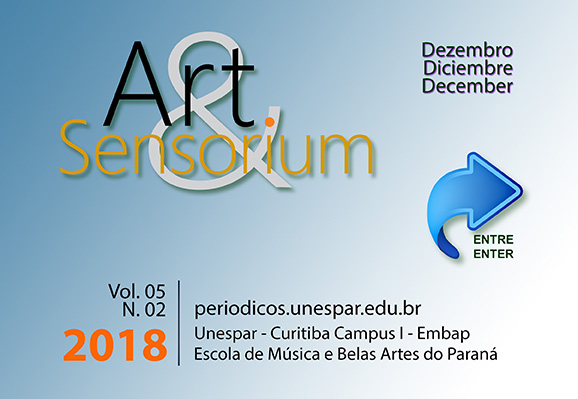Aesthetic Education and Sensitivity from the Thought of Friedrich Schiller
DOI:
https://doi.org/10.33871/23580437.2018.5.2.125-135Palavras-chave:
Education. Aesthetics. Sensitivities. Schiller.Resumo
In this article, we reflect on the aesthetic formation of man from the dialogue established between Friedrich Schiller and the Duke of Augustenburg, what we know today as the letters of Schiller. We try to problematize some theoretical assumptions present in these letters regarding the subject and how this constructions shapes subjectivity from aesthetic sensations. The objective of this research is to understand the (de) appreciation of the sensitive and the (dis) equilibrium between human nature, sensibility and aesthetic education of man, with Schiller's letters as a universe of reflection. It is a research of a bibliographic nature, of an exploratory-descriptive nature. The premises presented in the present study point out that the questions raised by the philosopher are still present to the understanding of how aesthetic formation dialogues with the constitution of subjectivities, morality and, above all, with the appreciation of sensitivities as mobilizers of human existence.
Downloads
Downloads
Publicado
Edição
Seção
Licença
Copyright (c) 2022 Revista Interdisciplinar Internacional de Artes Visuais - Art&Sensorium

Esta obra está licenciado com uma Licença Creative Commons Attribution 3.0 Unported License.
Autores que publicam nesta revista concordam com os seguintes termos:- Autores mantém os direitos autorais e concedem à revista o direito de primeira publicação, com o trabalho simultaneamente licenciado sob a Licença Creative Commons Attribution que permite o compartilhamento do trabalho com reconhecimento da autoria e publicação inicial nesta revista.
- Autores têm autorização para assumir contratos adicionais separadamente, para distribuição não-exclusiva da versão do trabalho publicada nesta revista (ex.: publicar em repositório institucional ou como capítulo de livro), com reconhecimento de autoria e publicação inicial nesta revista.
- Autores têm permissão e são estimulados a publicar e distribuir seu trabalho online (ex.: em repositórios institucionais ou na sua página pessoal) a qualquer ponto antes ou durante o processo editorial, já que isso pode gerar alterações produtivas, bem como aumentar o impacto e a citação do trabalho publicado (Veja O Efeito do Acesso Livre).





